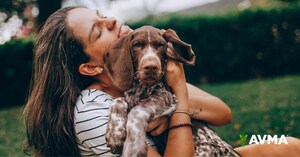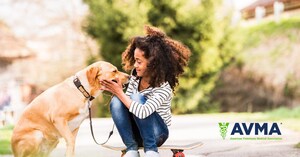Halloween can be a scary time for pets; AVMA shares tips on keeping them safe
SCHAUMBURG, Ill., Oct. 26, 2021 /PRNewswire/ -- After a year of scaled-back activities due to COVID-19, trick-or-treaters are likely to be out in full force for Halloween this weekend. While this is great news for those who celebrate the holiday, it may pose some additional risks to our pets.
From toxic treats to dangerous decorations to constricting costumes, Halloween can be a scary and dangerous time for our pets. The American Veterinary Medical Association (AVMA) is warning pet owners to beware of the following risks, and sharing tips on what pet owners can do to make Halloween safer for their furry friends:
Candy: Halloween means a lot of candy in the house. Although it might be a little tough to turn down those begging eyes watching you unwrap another mini candy bar, it's best to refrain from feeding your pets any of these Halloween treats, especially if they contain chocolate or xylitol (a common sugar substitute found in sugar-free candies and gum). These can be dangerous, even fatal, to your pets.
Costumes: Our pets may look extremely cute dressed up for Halloween, but costumes can cause problems if you're not careful. Make sure they fit properly and don't hinder sight, hearing, breathing, opening of the mouth or movement, and that they have no pieces that can easily be chewed off or cause choking. If your pet seems uncomfortable, overly constricted or just generally miserable in the costume, don't force it on them.
Decorations: Halloween decorations can be a fun way to create a festive atmosphere for the holiday, but beware of decorations that can be dangerous to pets. This can include objects that curious pets may knock over or chew, causing an obstruction in their stomach which can be life-threatening or require surgery. It is best to keep lit candles, jack-o-lanterns, glow sticks, glow jewelry and other decorations out of pets' reach, as these can cause burns or even fires in the home.
Trick or Treating: If trick-or-treating is allowed and can be safely done in your neighborhood, make sure you take steps to keep your pets safe as well. All of the noises of knocking, doorbells ringing, strangers in costumes shouting "trick or treat," coupled with the frequent opening and closing of the door can stress your pets and give them opportunities to escape. Take caution whenever you open the door to ensure they are not in a position to escape, and make sure they have proper identification (collar and microchip) in case they do. In addition, give your pet a quiet, safe hiding place inside and away from activity. They should have a chance to observe what's going on (they might like watching people from the window) but they should also have a chance to remove themselves from any noise or activity.
For more tips on keeping your pets safe this Halloween, visit AVMA's "7 things you can do to make Halloween safer for your pet" page.
For more information, contact Michael San Filippo, AVMA media relations manager, at 847-732-6194 (cell) or [email protected].
About the American Veterinary Medical Association
The AVMA, founded in 1863, is one of the oldest and largest veterinary medical organizations in the world, with more than 97,000 member veterinarians worldwide engaged in a wide variety of professional activities and dedicated to the art and science of veterinary medicine. Visit avma.org to learn more.
SOURCE American Veterinary Medical Association

Related Links
WANT YOUR COMPANY'S NEWS FEATURED ON PRNEWSWIRE.COM?
Newsrooms &
Influencers
Digital Media
Outlets
Journalists
Opted In




Share this article